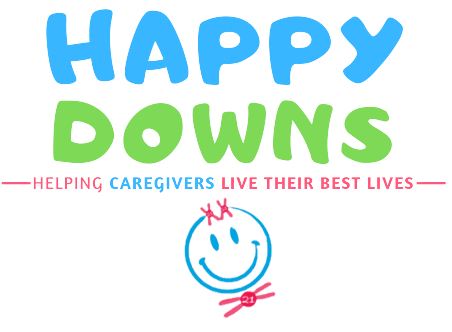Navigating the world of adolescence is a beautiful and challenging journey for all parents. When your teen has Down Syndrome, this journey can feel even more complex. One of the most important, yet often daunting, aspects of parenting a teenager is sex education.
We understand that talking about sex with your child can feel overwhelming, especially when they have a disability. But it’s crucial to remember that sex education is a vital part of your teen’s overall health and well-being. Just like any other teenager, individuals with Down Syndrome experience physical and emotional changes, and they deserve the knowledge and tools to navigate these experiences confidently.
It’s important to acknowledge that many family caregivers, regardless of whether their child has a disability, often feel unsure or uncomfortable talking about sex. Many of us didn’t have anyone guide us through these conversations when we were growing up—we had to figure things out on our own. But we don’t have to pass that uncertainty on to the next generation. Now is the time for us, as caregivers, to educate ourselves so that we can provide clear, honest, and supportive guidance to our teens (and adults too). We can start by reading reliable resources, like books and articles from experts on sexual health and disability, attending workshops or webinars that focus on sex education for teens with intellectual disabilities, and even seeking support from healthcare professionals who specialize in this area. By taking these steps, we empower not only our children but ourselves to break the silence and foster healthy, open communication about sex.
Sexual Development in Teens with Down Syndrome
Adolescence is a time of incredible growth and change. Your teen is experiencing a whirlwind of physical, emotional, and social development. These changes are natural and exciting, but they can also be a bit overwhelming.
For teens with Down Syndrome, these developmental milestones may unfold at a different pace or in unique ways. It’s essential to remember that every individual with Down Syndrome is different, and their experiences will vary widely. Some teens may show early signs of puberty, while others may develop at a slower pace. Their emotional and social understanding might also differ from their peers.
The key is to focus on your teen’s individual needs and learning style. By understanding their strengths and challenges, you can tailor your approach to sex education to ensure they feel comfortable and confident.
Breaking the Ice: Initiating Sex Education Conversations

Starting the Conversation
Starting a conversation about sex education with your teenager can feel daunting, but it’s a crucial step in their growth and understanding. It’s important to approach this discussion with sensitivity and patience, creating an environment where your teen feels comfortable and respected.
Utilize Everyday Situations: Everyday moments can provide natural opportunities to start discussions. For example, if you’re watching a TV show or reading a book together, use relevant scenes or characters to gently introduce topics related to sex education. This can make the conversation feel more organic and less intimidating.
Create a Safe Space: Open communication is key. Let your teen know that they can ask any questions they have, and reassure them that you’re there to provide honest and supportive answers. Emphasize that their curiosity is natural and that there are no “wrong” questions.
Use Resources: Visual aids can be incredibly helpful. Picture books or social stories designed for explaining sexual development (not pornography) can break down complex concepts into more understandable pieces. These resources can offer a foundation that makes it easier for your teen to grasp basic ideas.
Be Patient and Persistent: Remember, this conversation doesn’t have to happen all at once. You can revisit the topic regularly, providing information in manageable chunks. It’s okay to take breaks and come back to it as your teen’s understanding evolves.
By approaching the topic with openness and using everyday opportunities as conversation starters, you’ll help create a supportive environment where your teen feels informed and empowered.
Personalized Sex Education: Meeting Your Teen’s Unique Needs
Every teenager is unique, and their approach to learning about sex education should reflect their individual needs and abilities. Here’s how you can tailor your approach to best support your teen with Down Syndrome:
Understand Your Teen’s Needs: Begin by considering your teen’s cognitive abilities, social skills, and emotional maturity. This will guide you in choosing the most effective methods for teaching. Remember, there is no one-size-fits-all approach; personalization is key.
Visual Learners: If your teen learns best through visuals, incorporate diagrams, pictures, and videos. Visual aids can make abstract concepts more concrete. For example, using illustrated books or drawing simple diagrams can help explain body parts and their functions clearly.
Auditory Learners: If your teen responds well to auditory information, use verbal explanations and discussions. Be sure to speak clearly and use straightforward language. Role-playing scenarios or using educational videos with clear narration can also be effective.
Kinesthetic Learners: For teens who learn best through physical activity, try incorporating role-playing exercises. Acting out scenarios or using models and props can help them understand concepts by “doing” rather than just listening or viewing. This method is suitable for teaching your teen how to conduct themselves when they interact with someone they are attracted to or how they can establish boundaries with others.
Use Social Stories: Social stories are a fantastic tool for explaining social situations and expectations. Tailor these stories to your teen’s specific needs and situations, making them relatable and easy to understand. For instance, a social story about how to handle feelings of attraction or setting boundaries can be very helpful.
Simple and Direct Language: Regardless of your teen’s learning style, always use simple, direct language. Avoid jargon and complex terms. Clear explanations and consistent reinforcement of key points help ensure understanding.
By adapting your teaching methods to match your teen’s learning style, you’ll make the information more accessible and meaningful. This personalized approach not only enhances their understanding but also fosters confidence as they navigate their sexual development.
Essential Topics for Sex Education for Teens with Down Syndrome
When discussing sex education with your teenager, it’s important to focus on essential topics without overwhelming them with too much detail. Here’s a guide to the key areas you should cover:
1. Body Parts and Their Proper Names: Start with the basics by teaching the names of body parts and their functions. Use correct anatomical terms to promote a healthy understanding of their own body and reduce any potential embarrassment or confusion.
2. Puberty and Physical Changes: Explain the changes that occur during puberty, such as growth spurts, changes in body shape, and the development of secondary sexual characteristics, e.g., menstruation or voice deepening. Use clear, straightforward language to describe these changes, and reassure your teen that these changes are a normal part of growing up.
3. Hygiene and Self-Care: Discuss the importance of personal hygiene and self-care, including topics like bathing, menstruation (if applicable), and the importance of wearing clean clothes. Emphasize the role of good hygiene in maintaining health and self-confidence.
4. Healthy Relationships: Talk about the qualities of healthy relationships, whether they are friendships or romantic relationships. Discuss respect, kindness, and effective communication. Make sure to explain that everyone deserves to be treated with respect and to have their own boundaries respected.
5. Boundaries and Consent: Teach your teen about personal boundaries and the concept of consent. Explain that they have the right to say “no” and that others must respect their boundaries as well. Role-play different scenarios to help them practice setting and respecting boundaries.
6. Body Safety and Recognizing Inappropriate Behavior: Help your teen understand what constitutes inappropriate behavior and body safety. Discuss the concept of “good touch” and “bad touch” and the importance of speaking up if they feel uncomfortable or if someone crosses their boundaries.
By focusing on these key topics, you’ll provide your teen with the foundational knowledge they need to navigate their own development and relationships safely and confidently. Remember to keep the conversation open and ongoing, allowing your teen to ask questions and seek clarification as they continue to grow and learn.
Effective Teaching Strategies for Sensitive Subjects
Teaching sex education effectively involves breaking down complex information into manageable, understandable parts. Here are some strategies to help convey each key topic:
1. Body Parts and Their Proper Names
- Use Visual Aids: Incorporate labeled diagrams or anatomical models to help your teen understand and identify body parts. Visual aids can make abstract concepts more concrete.
- Reinforce with Repetition: Regularly review the names and functions of body parts to reinforce learning. Use everyday opportunities to integrate this knowledge naturally.
- Interactive Tools: Consider using educational apps or online resources that offer interactive diagrams and explanations.
2. Puberty and Physical Changes
- Break It Down: Explain the changes that occur during puberty in stages. Discuss physical changes separately from emotional changes to avoid overwhelming your teen.
- Use Positive Language: Frame the discussion in a positive and matter-of-fact manner. Highlight the normalcy and natural progression of these changes to reduce anxiety.
- Provide Resources: Offer books or videos designed for teens that cover puberty and physical changes in a clear, age-appropriate way.
3. Hygiene and Self-Care
- Create a Routine: Develop a consistent routine for discussing hygiene and self-care. Use visual schedules or checklists to help your teen remember and follow hygiene practices.
- Role-Play Scenarios: Practice scenarios like washing hands, bathing, or using hygiene products together. This hands-on approach can help your teen become more comfortable with these tasks.
- Use Social Stories: Tailor social stories to explain the importance of hygiene and self-care in a relatable way.
4. Healthy Relationships
- Discuss Examples: Use real-life examples or stories to illustrate what makes a relationship healthy. Highlight qualities like respect, kindness, and open communication.
- Role-Play: Engage in role-playing exercises to practice how to communicate effectively and handle different social situations. This can help your teen understand and apply the principles of healthy relationships.
- Encourage Open Dialogue: Foster an environment where your teen feels comfortable discussing their relationships and experiences. Provide guidance and support as needed.
5. Boundaries and Consent
- Use Simple Scenarios: Present simple, clear scenarios to explain the concept of boundaries and consent. Use examples that your teen can relate to, such as sharing personal space or asking for permission before touching someone.
- Practice Through Role-Play: Role-play different situations where your teen needs to set or respect boundaries. This practice helps reinforce the importance of consent and respectful behavior.
- Emphasize Empowerment: Reassure your teen that they have the right to set boundaries and say “no” when necessary. Empower them to advocate for themselves and respect others’ boundaries.
6. Body Safety and Recognizing Inappropriate Behavior
- Use Clear, Direct Language: Explain body safety and inappropriate behavior using straightforward language. Make sure your teen understands the difference between acceptable and unacceptable touch.
- Discuss Safety Strategies: Teach your teen strategies for staying safe and what to do if they encounter inappropriate behavior. Encourage them to speak up and seek help if they feel uncomfortable.
- Provide Support Resources: Share resources such as trusted adults or professionals they can turn to for support and advice.
By using these strategies, you can make the learning process more engaging and effective, helping your teen grasp important concepts and feel confident in applying what they’ve learned.
Beyond the Basics: Addressing Social and Emotional Challenges

Navigating sex education with your teen also involves addressing broader social and emotional factors. Here are some additional considerations to keep in mind:
1. Address Potential Social Challenges
- Discuss Peer Interactions: Talk about common social situations your teen may encounter, such as peer pressure or teasing. Role-play scenarios to practice handling these situations confidently and assertively.
- Provide Reassurance: Let your teen know that it’s okay to be different and that they have the right to be treated with respect. Encourage them to seek support from trusted friends, family members, or mentors.
2. Role-Play Social Situations
- Practice Social Skills: Use role-playing to help your teen navigate social interactions. This can include scenarios like saying “no,” asking for help, or setting boundaries. Role-playing provides a safe space for practicing these skills and gaining confidence.
- Discuss Real-Life Examples: Share stories or examples that relate to social challenges your teen may face. Discuss how to handle specific situations and reinforce the importance of self-respect and respect for others.
3. Explore Healthy Ways to Express Feelings
- Encourage Emotional Expression: Teach your teen how to express their emotions in healthy ways. This could include talking about their feelings, journaling, or engaging in creative activities like drawing or music.
- Promote Coping Strategies: Discuss and practice coping strategies for managing stress or strong emotions. Techniques like deep breathing, physical activity, or relaxation exercises can be helpful.
4. Respect Privacy and Boundaries
- Model Respectful Behavior: Demonstrate how to respect others’ privacy and boundaries in your own actions. Show your teen the importance of treating others with consideration and understanding.
- Encourage Self-Advocacy: Empower your teen to assert their own boundaries and to respect others’ boundaries. Reinforce the idea that healthy relationships are built on mutual respect and understanding.
5. Provide Ongoing Support
- Maintain Open Communication: Keep the lines of communication open and encourage your teen to approach you with any questions or concerns. Regularly check in to see how they are feeling and if they need additional support.
- Seek Professional Guidance: If you encounter challenges or need additional support, consider consulting professionals such as therapists or sex educators who have experience working with individuals with Down Syndrome. They can offer valuable insights and resources tailored to your teen’s needs.
By addressing these additional considerations, you can help your teen navigate social and emotional aspects of their development with greater ease. Creating a supportive and understanding environment will empower them to handle various challenges and thrive in their personal growth.
Empowering Your Teen Through Open Communication
Navigating sex education with your teenager is a journey that requires sensitivity, patience, and ongoing support. By focusing on open communication, tailoring your approach to their unique learning style, and covering essential topics, you can provide your teen with the knowledge and confidence they need to understand and manage their own development and relationships.
Remember that sex education is not a one-time conversation but an ongoing dialogue. Continue to engage with your teen about these topics as they grow and their understanding deepens. Empower them to make informed decisions, respect their own boundaries, and navigate their social interactions with confidence.
Your support plays a crucial role in fostering your teen’s self-esteem and ensuring they feel secure in their own bodies and relationships. By creating a safe, open environment for discussion and learning, you help them build a foundation for healthy relationships and personal growth.
Ultimately, the goal is to equip your teen with the tools they need to thrive in their journey towards adulthood, ensuring they feel confident, informed, and respected. Embrace this opportunity to strengthen your bond with your teen and to guide them with compassion and understanding as they explore these important aspects of their lives.






